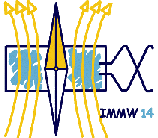Speaker
Dr
Animesh Jain
(Brookhaven National Laboratory, USA)
Description
BNL is building a pair of compact multi-function superconducting magnets to be
placed inside the BES experimental detector solenoid for a luminosity upgrade of
the
Electron Positron Collider (BEPC-II) at IHEP, Beijing. These magnets are produced
by a direct wind technology, originally developed at BNL for the HERA luminosity
upgrade at DESY. The main quadrupole layers of the magnets, in particular, have a
very stringent field quality requirement, and consist of four double layers of a 6-
around-1 conductor. Results of warm measurements after winding each double-layer
were used to cancel any unwanted harmonics by suitably changing the next layer. It
was possible to achieve excellent field quality, as measured warm, using this
approach. However, when tested cold, both magnets showed a rather large change in
the sextupole terms. Several possible causes for this change, including an
influence of the measuring coil alignment resulting from a unique feature of the
magnet coil, were investigated. The problem was finally traced to an unexpectedly
high ferrite content in a small azimuthal region of the stainless steel tubes used
for the coil support. This paper will discuss the possibilities considered, and
the
various magnetic measurements carried out to understand the warm-cold difference.
Summary
Large warm to cold changes were observed in the sextupole harmonic of quadrupole
magnets. Various possibilities were investigated to understand these changes with
the help of suitable magnetic measurements.
Author
Dr
Animesh Jain
(Brookhaven National Laboratory, USA)
Co-authors
Mr
George Ganetis
(Brookhaven National Laboratory)
Dr
Peter Wanderer
(Brookhaven National Laboratory)
